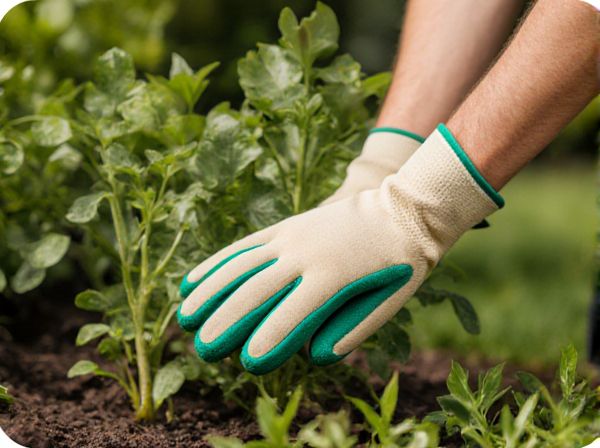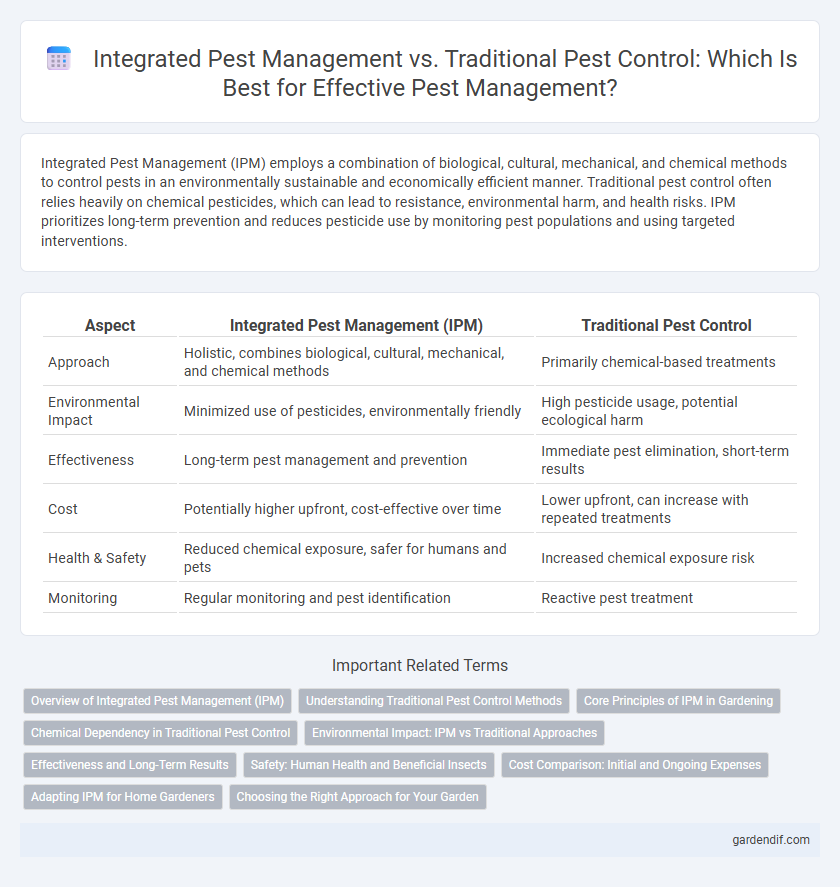
Integrated Pest Management vs Traditional Pest Control Illustration
Integrated Pest Management (IPM) employs a combination of biological, cultural, mechanical, and chemical methods to control pests in an environmentally sustainable and economically efficient manner. Traditional pest control often relies heavily on chemical pesticides, which can lead to resistance, environmental harm, and health risks. IPM prioritizes long-term prevention and reduces pesticide use by monitoring pest populations and using targeted interventions.
Table of Comparison
| Aspect | Integrated Pest Management (IPM) | Traditional Pest Control |
|---|---|---|
| Approach | Holistic, combines biological, cultural, mechanical, and chemical methods | Primarily chemical-based treatments |
| Environmental Impact | Minimized use of pesticides, environmentally friendly | High pesticide usage, potential ecological harm |
| Effectiveness | Long-term pest management and prevention | Immediate pest elimination, short-term results |
| Cost | Potentially higher upfront, cost-effective over time | Lower upfront, can increase with repeated treatments |
| Health & Safety | Reduced chemical exposure, safer for humans and pets | Increased chemical exposure risk |
| Monitoring | Regular monitoring and pest identification | Reactive pest treatment |
Overview of Integrated Pest Management (IPM)
Integrated Pest Management (IPM) is an environmentally sustainable approach that combines biological, cultural, physical, and chemical methods to manage pest populations effectively. IPM emphasizes monitoring pest levels, using targeted interventions only when necessary to minimize pesticide use and reduce risks to human health and the environment. This strategy enhances long-term pest control, preventing resistance and promoting ecological balance compared to traditional pest control methods that rely heavily on routine chemical applications.
Understanding Traditional Pest Control Methods
Traditional pest control methods primarily rely on chemical pesticides for immediate elimination of pests, often neglecting long-term environmental impacts. These approaches typically involve scheduled applications without thorough pest population monitoring, increasing the risk of pesticide resistance and harm to non-target organisms. Understanding these limitations highlights the need for more sustainable solutions like Integrated Pest Management strategies.
Core Principles of IPM in Gardening
Integrated Pest Management (IPM) in gardening emphasizes monitoring pest populations, using threshold levels to decide intervention, and prioritizing biological, cultural, and mechanical control methods over chemical treatments. IPM core principles focus on enhancing ecosystem health by promoting natural pest predators and minimizing pesticide use to reduce environmental impact. This strategic approach supports sustainable pest control by balancing effective pest suppression with long-term garden vitality.
Chemical Dependency in Traditional Pest Control
Traditional pest control heavily relies on chemical pesticides, often leading to increased resistance among pest populations and environmental contamination. Integrated Pest Management (IPM) minimizes chemical dependency by combining biological controls, cultural practices, and mechanical methods to sustainably manage pests. This approach reduces the risks associated with chemical residues and promotes long-term ecosystem health.
Environmental Impact: IPM vs Traditional Approaches
Integrated Pest Management (IPM) significantly reduces environmental impact by utilizing targeted biological controls and minimizing chemical pesticide use. Traditional pest control methods often rely on broad-spectrum pesticides that can harm non-target species and contaminate soil and water. By promoting sustainable practices, IPM preserves ecosystem health and reduces the risk of pesticide resistance and pollution.
Effectiveness and Long-Term Results
Integrated Pest Management (IPM) incorporates biological, cultural, and mechanical controls with minimal pesticide use, leading to more sustainable and effective pest suppression over time. Traditional pest control relies heavily on chemical pesticides, which may offer rapid but short-term results, often resulting in pest resistance and environmental harm. IPM's targeted approach reduces pest populations sustainably, preserving ecosystem health and ensuring long-term pest management success.
Safety: Human Health and Beneficial Insects
Integrated Pest Management (IPM) prioritizes safety by minimizing chemical pesticide use, thereby reducing risks to human health and preserving beneficial insects such as pollinators and natural predators. Traditional pest control often relies on broad-spectrum chemical treatments that can harm non-target organisms and increase pesticide resistance. By utilizing targeted, environmentally friendly strategies, IPM enhances ecosystem balance and promotes long-term pest suppression without compromising safety.
Cost Comparison: Initial and Ongoing Expenses
Integrated Pest Management (IPM) often requires higher initial investment due to monitoring equipment and expert consultations, yet it reduces long-term expenses by minimizing pesticide use and preventing pest resistance. Traditional pest control typically involves lower upfront costs but incurs ongoing expenses from repeated chemical applications and potential environmental damage. Over time, IPM proves cost-effective by emphasizing sustainable, targeted strategies that lower overall pest management expenditures.
Adapting IPM for Home Gardeners
Integrated Pest Management (IPM) for home gardeners emphasizes targeted pest control methods such as biological controls, habitat manipulation, and resistant plant varieties to minimize chemical use and environmental impact. Traditional pest control often relies heavily on synthetic pesticides, posing risks to beneficial insects, soil health, and human safety. Adapting IPM in home gardens promotes sustainable pest suppression by combining monitoring, threshold-based interventions, and natural remedies tailored to specific pest challenges.
Choosing the Right Approach for Your Garden
Integrated Pest Management (IPM) utilizes a combination of biological, cultural, mechanical, and chemical methods to minimize pest damage while promoting environmental sustainability. Traditional pest control often relies heavily on chemical pesticides, which can lead to resistance and harm beneficial insects in your garden. Selecting IPM supports long-term garden health and reduces chemical exposure, making it a more effective and eco-friendly choice for sustainable pest management.
Integrated Pest Management vs Traditional Pest Control Infographic

 gardendif.com
gardendif.com